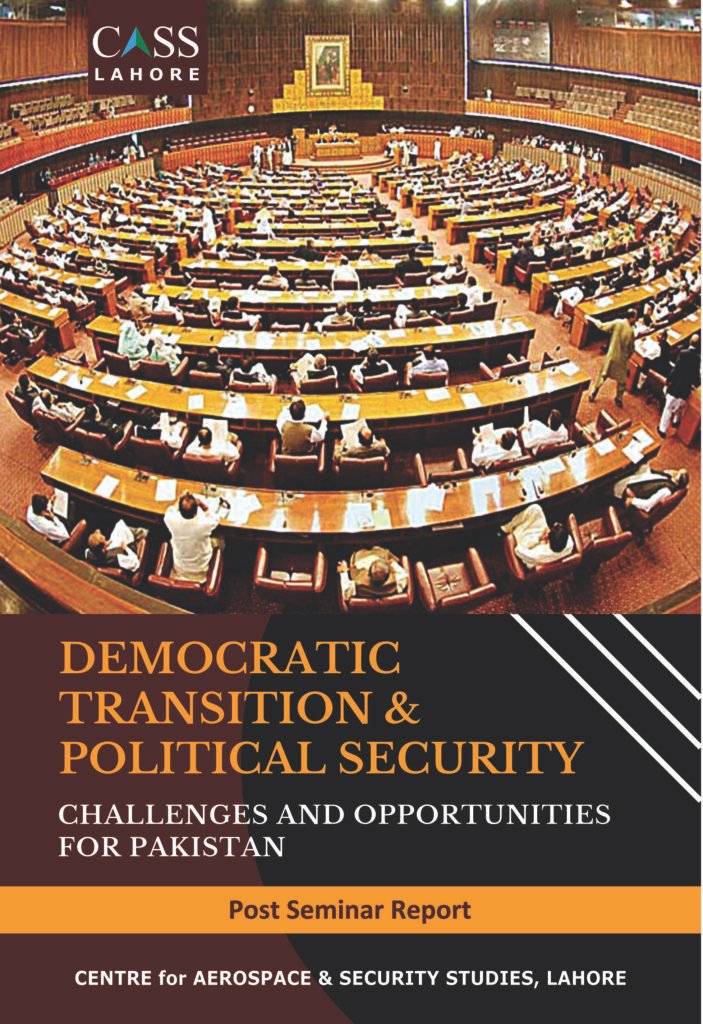
Democratic Transition and Political Security: Challenges and Opportunities for Pakistan
October 24, 2024
PRESIDENT
Air Marshal Asim Suleiman (Retd)
SEMINAR COORDINATOR
Ameer Abdullah Khan
MASTER OF CEREMONY
Warisha Rashid
Executive Summary
The seminar titled “Democratic Transition and Political Security: Challenges and Opportunities for Pakistan”, hosted by the Centre for Aerospace and Security Studies (CASS) on 24 October 2024, brought together prominent experts to examine the intersection of democratic governance and national security in Pakistan. Against a backdrop of historical complexities and contemporary challenges, speakers explored critical themes including civil-military relations, constitutional governance, political stability, and the role of institutions in safeguarding democracy. With a focus on identifying both challenges and pathways to a more resilient democratic framework, the seminar sought to provide actionable insights for strengthening Pakistan’s political fabric, ensuring stability, and enhancing the country’s engagement on the international stage.
The seminar opened with remarks by Mr Ameer Abdullah Khan, Senior Researcher at CASS Lahore, who underscored the importance of democratic governance as central to Pakistan’s national security. He noted that Pakistan’s democratic journey has been complex and challenging, marked by resilience but also by obstacles such as political polarisation, institutional weaknesses, and socio-economic disparities. He highlighted that each successive parliamentary transitions signifiy Pakistan’s ongoing commitment to democracy, though challenges remain.
Mr Khan framed political security as essential to national stability, emphasising that it goes beyond electoral processes to protect the constitutional framework, ideological principles, and institutional continuity. Drawing on examples from regions like Syria and Yemen, he illustrated how political instability can lead to internal collapse and civil strife. He also highlighted that a stable political environment strengthens foreign policy by enhancing a nation’s credibility on the international stage.
Mr Ahmed Bilal Mehboob, President of PILDAT, delivered the keynote address, “From Past to Present: Political Evolution of Pakistan,” examining historical and contemporary challenges shaping Pakistan’s political security. Dividing his analysis into two parts, he first outlined five core influences on Pakistan’s political evolution, followed by indicators reflecting its current democratic health.
Mr Mehboob discussed Islam’s role in Pakistan’s identity, noting that while Pakistan was established as a homeland for Muslims, the idea of an Islamic state was not uniformly accepted. He highlighted Quaid-e-Azam Muhammad Ali Jinnah’s vision of religious freedom, pointing out the ongoing challenges of balancing religious identity with democratic governance.
He also addressed Pakistan’s longstanding demand for provincial autonomy, dating back to the Lahore Resolution of 1940, noting that inadequate autonomy contributed to the loss of East Pakistan. While the 18th Amendment has improved federal-provincial dynamics, resource distribution and demands for new provinces remain issues requiring attention.
Pakistan’s security-first approach, driven by tensions with India, has prioritised defence over social and economic development. Mehboob traced this emphasis to historical security concerns post-partition, which influenced Pakistan’s military engagement and defence spending. Additionally, he noted an institutional imbalance stemming from a strong military presence that fills gaps left by weaker civilian institutions.
Pakistan’s experience with parliamentary democracy has been marked by interruptions from military takeovers, highlighting the need for sustained democratic commitment. Mehboob advocated for adherence to the 1973 Constitution as a cornerstone for political stability, while highlighting the need for electoral reform to counter declining voter turnout and public trust in democratic processes.
The speaker pointed to challenges within Pakistan’s National Assembly, where disruptions and low parliamentary engagement undermine productivity. He also highlighted the personality-centric nature of political parties, which limits internal democracy and restricts new leadership opportunities. Mehboob expressed concerns over interference from non-political actors, which has destabilised key institutions and damaged public trust. Finally, Mr Mehboob emphasised strengthening local government to reduce burdens on national legislators, improve grassroots service delivery, and support democratic consolidation in Pakistan.
Mr Fahd Husain, President of Aik News, presented a comprehensive analysis of Pakistan’s political stability challenges, focusing on three core elements: fault lines, timelines, and bloodlines. These elements, he argued, capture the crises and societal issues affecting the nation’s cohesion.
Beginning with societal fault lines, Mr Husain highlighted Pakistan’s deepening political divide, noting that political rifts now permeate various social segments, posing a major threat to cohesion and stability. While political divides are common globally, he observed that in Pakistan, these divisions often weaken institutions and disrupt societal balance. Additionally, he identified a generational gap between “digital natives” (youth) and “digital aliens” (older individuals) as a critical fault line, exacerbating cultural divides. Brain drain, with educated youth seeking opportunities abroad, further compounds this issue, as does the high number of out-of-school children, which could impact Pakistan’s future socio-economic landscape. Another fault line he discussed is provincial grievances, especially in Khyber Pakhtunkhwa (KP) and Balochistan, where some factions hold reconcilable grievances while others, like the Tehrik-i-Taliban Pakistan (TTP), present irreconcilable challenges.
Mr Husain then addressed the role of timelines, emphasising the transformation brought about by digital media, which shifts individuals from passive consumers to active creators of content. While this is empowering, it also brings misinformation, polarisation, and a “silo effect,” where algorithms reinforce users’ biases, leading to echo chambers that narrow perspectives and deepen societal divides. He argued that this post-truth environment, marked by difficulty distinguishing fact from fiction, destabilises society and limits constructive dialogue.
Lastly, Husain discussed bloodlines, or dynastic politics, which dominate Pakistan’s political arena. He contended that entrenched political dynasties perpetuate an elitist system, stifling political participation and limiting opportunities for new voices to emerge. This elitism worsens class divides and prevents upward mobility, creating barriers for middle-class youth seeking political engagement. The resulting inequality and exclusion deepen societal disillusionment, adding to political instability as marginalised groups feel increasingly disengaged from mainstream political processes.
Prof. Dr Moonis Ahmar, in his address on “Avenue to Democratic Consolidation and Political Security of Pakistan,” explored the historical and structural challenges to Pakistan’s democratic stability. He traced the nation’s democratic evolution, highlighting persistent tensions between democratic ideals and authoritarian tendencies. He argued that the authoritarian culture and reluctance of elites to commit to democratic values undermine the growth of democracy in Pakistan.
Dr Ahmar identified several obstacles to democratic development, including the influence of elites who prioritise personal interests over democratic and constitutional principles. He contended that Pakistan’s democracy requires good governance, constitutional adherence, and robust institutions. Although Pakistan’s Constitution provides a strong foundation, frequent power struggles often compromise its principles.
He emphasised the need for political pluralism, advocating that state institutions foster an inclusive environment. Socio-economic inequalities, a weak education system, and low civic engagement further hinder democratic growth, while the absence of education on democratic principles fuels civic disengagement. Dr Ahmar also underscored the role of a free press, stating that open dissent and criticism strengthen democratic discourse.
Addressing political security, he argued that democratic consolidation depends on political stability, achievable only when leaders, institutions, and the public work for the common good. He criticised authoritarianism among leaders and stressed citizen welfare as central to democratic governance. Furthermore, he encouraged reforms in education to empower youth and increase civic awareness.
Dr Ahmar outlined principles for democratic consolidation, including upholding the rule of law, fighting corruption, empowering institutions, and promoting social development. He called for long-term reforms and a shift from power-centric governance to one focused on accountability and nation-building, asserting that only such changes would secure a stable democratic future for Pakistan.
In his closing address, Air Marshal Suleiman highlighted three essential pillars of a strong democracy: responsibility, transparency, and adherence to the rule of law. He explained that Pakistan’s democratic future depends on the stability of its political processes, the strength of its institutions, and the active participation of civil society. He also called for unwavering commitment to the Constitution, describing it as the “nation’s guiding light” that provides a stable foundation for democratic governance. He stressed the need for leaders to be accountable, uphold their duties, and ensure that the voices of citizens are integral to decision-making.
Addressing Pakistan’s political security, he highlighted both domestic and international challenges. Internally, political division and economic pressures, including inflation and unemployment, threaten cohesion and deepen social divides. Externally, he pointed to regional tensions and the pressures of global powers as factors that further complicate Pakistan’s path to achieving a stable democracy.
He also recognised the crucial role of the media, describing it as the “fourth pillar of democracy” that shapes public opinion and fosters informed discussions on national issues. He advocated for using media effectively to increase public engagement and political participation. Furthermore, he praised social media as a platform for youth empowerment, enabling young citizens to share their views and engage with leaders on national matters, while also recognising the challenges of misinformation.
Air Marshal Asim (Retd) suggested that consolidating democracy requires a comprehensive approach, involving policy reforms to improve governance, accountability, and fairness across society. He asserted that strengthening institutions fosters public trust and stability, creating confidence among citizens in systems that protect their rights and welfare. He further argued for economic reforms to reduce poverty, foster inclusive growth, and support national stability, alongside a robust military to secure national defence.
On foreign policy, he emphasised that internal stability is foundational to effective international relations. He advocated for Pakistan to cultivate strong ties with regional and global allies, with political stability at home serving as a crucial foundation for credible and constructive foreign relations.
In closing, he called for a unified, collective approach to democratic progress, urging politicians, institutions, civil society, and citizens to work together in building a brighter, more democratic future. Reflecting on the lessons from Pakistan’s past, he emphasised the importance of applying these insights towards strengthening democracy and securing the nation’s future stability.
The interactive session delved into themes central to Pakistan’s democratic stability, focusing on civil-military relations, constitutional custodianship, local governance, and the balance between security and civil liberties. Comparisons were drawn between Pakistan and India’s democratic trajectories, highlighting the role of early leadership and consistent constitutional development in India’s relative political stability. A significant point raised was the enduring challenge of defining the custodian of the constitution in Pakistan, with both the judiciary and parliament frequently overstepping their domains in a struggle for interpretative authority. The speakers suggested that mutual respect for institutional boundaries is essential to reduce these conflicts.
The session also highlighted the importance of empowering local governments, as Pakistan’s centralised governance model has often overburdened national legislators with local issues. A strengthened local government, it was argued, would enable legislators to focus on national issues, fostering a more balanced political structure. The session stressed the role of civic education in fostering democratic participation and constructive engagement, especially among youth. By instilling knowledge of democratic principles and critical thinking, speakers contended that Pakistan could cultivate a citizenry more invested in accountability and governance reform.
The seminar provided with profound insights into the intricate relationship between democratic processes and political stability of Pakistan. The discussions highlighted the significant challenges faced by the nation and explored the opportunities for reform and innovation that can lead to a more resilient political framework.
Guest Speakers
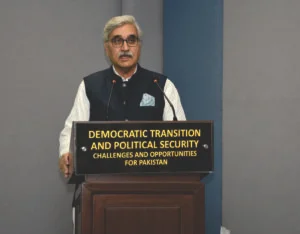
Mr Ahmed Bilal Mehboob
President, Pakistan Institute of Legislative Development and Transparency
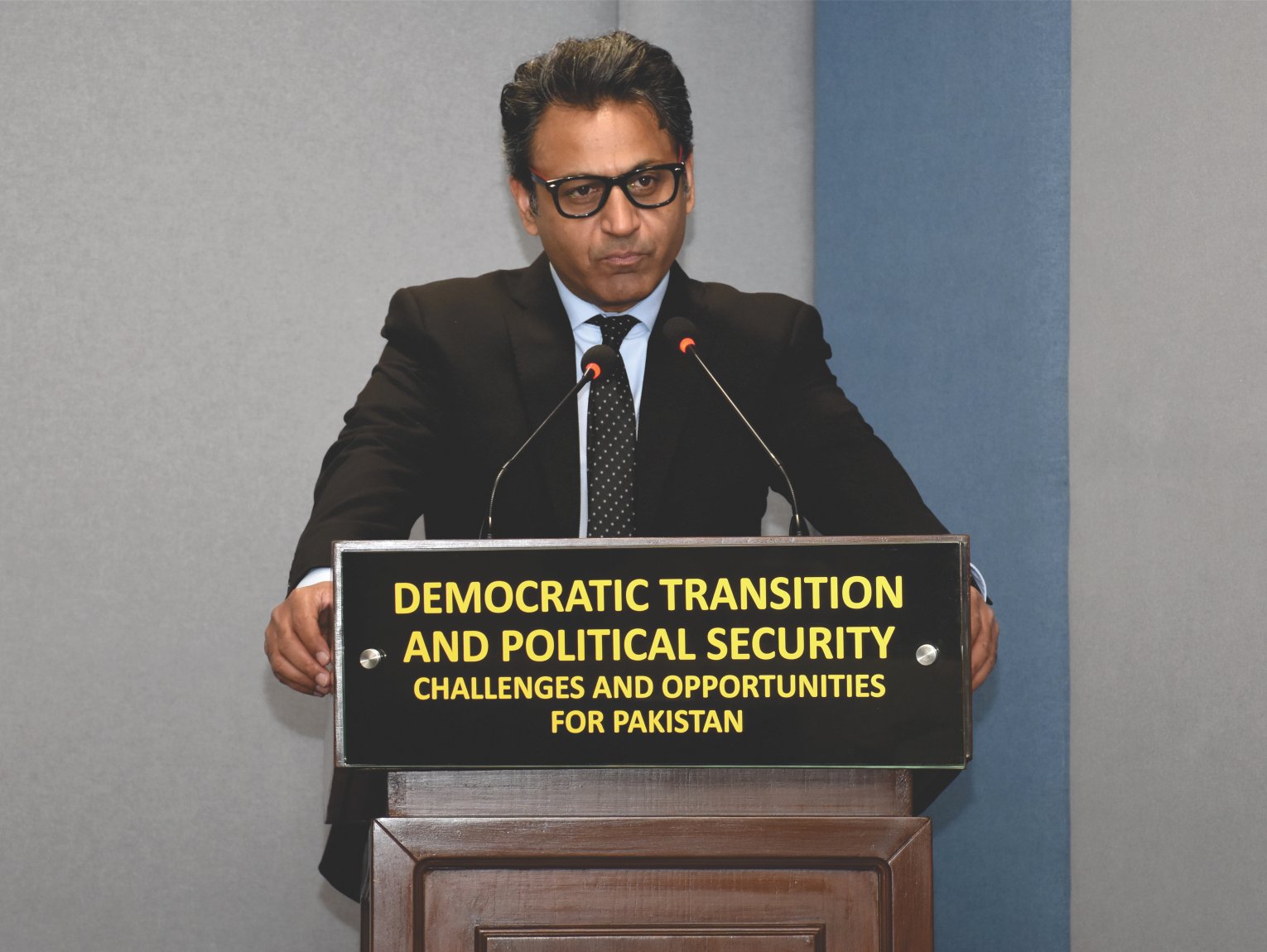
Mr Fahad Hussain
President, Aik NewsDigital
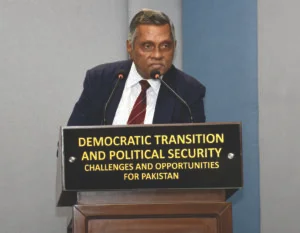
Dr Moonis Ahmar
Meritorious Professor, University of Karachi
CASS Speakers
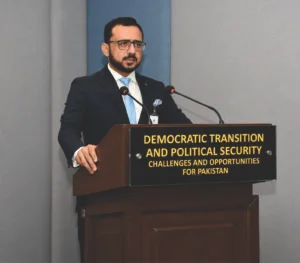
Ameer Abdullah Khan
Senior Researcher, CASS Lahore
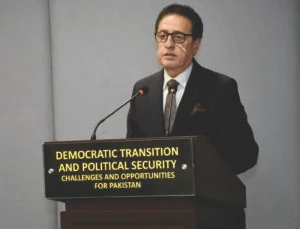
Air Marshal Asim Suleiman (Retd)
President CASS, Lahore
CASS LAhore

The Centre for Aerospace & Security Studies (CASS) was established in July 2021 to inform policymakers and the public about issues related to aerospace and security from an independent, non-partisan and future-centric analytical lens.


